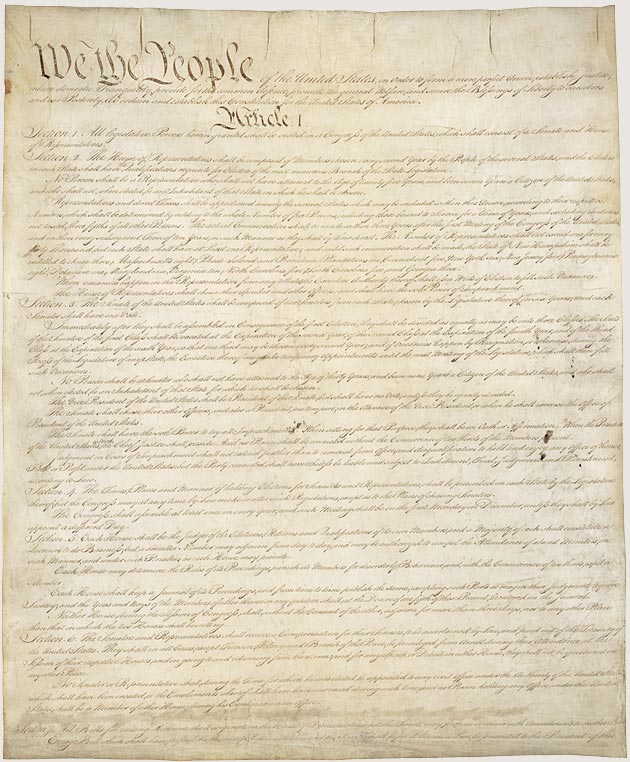Today, September 17, 2020, is Constitution Day in the United States, where we celebrate the ratification of the United States Constitution. To commemorate the occasion, I will share with you an interesting analysis of one of the most hallowed lines in the preamble to the Constitution – “a more perfect union.”
Preamble Background
The preamble to the Constitution reads as follows:
We the People of the United States, in Order to form a more perfect Union, establish Justice, insure domestic Tranquility, provide for the common defense, promote the general Welfare, and secure the Blessings of Liberty to ourselves and our Posterity, do ordain and establish this Constitution for the United States of America.
Preamble to the United States Constitution.
The text upon which I will rely for this post is the section on the preamble from The Heritage Guide to the Constitution. This section of the Heritage guide was authored by the late Forrest McDonald, who was a history professor at the University of Alabama.
Perhaps surprisingly given the beauty of the language of the preamble, Mr. McDonald explained that it was composed “as an afterthought,” and unlike most of the provisions of the Constitution proper, was not debated by the delegates. The words themselves were put to parchment by Gouverneur Morris, a delegate from Pennsylvania and, as Mr. McDonald noted, a member of the Committee on Style at the Convention.
While the preamble ties together the main purposes of the document, Mr. McDonald noted that the delegates to the Convention did not view it as having “substantive legal meaning.” That is, the preamble served as a sort of introduction, but unlike the Constitution proper, was not law.
I learned from reading the Heritage Guide a couple of years ago that the Supreme Court of the United States agreed that the preamble itself is not law in its 1905 decision in Jacobson v. Massachusetts, 197 U.S. 11 (1905). Writing for the Court, then Justice John Marshall Harlan, wrote as follows:
Although that Preamble indicates the general purposes for which the people ordained and established the Constitution, it has never been regarded as the source of any substantive power conferred on the Government of the United States or on any of its Departments. Such powers embrace only those expressly granted in the body of the Constitution and such as may be implied from those so granted. Although, therefore, one of the declared objects of the Constitution was to secure the blessings of liberty to all under the sovereign jurisdiction and authority of the United States, no power can be exerted to that end by the United States unless, apart from the Preamble, it be found in some express delegation of power or in some power to be properly implied therefrom.
Jacobson v. Masachusetts, 197 U.S. 11, 22 (1905).
“A More Perfect Union”
While the preamble itself is not law, its elegant and decisive prose, which succinctly sets forth “the general purposes for which the people ordained and established the Constitution,” has made it more well known than most provisions of the Constitution proper. While there is much to unpack in the preamble, I will focus only on the “more perfect union” language employed by Gouverneur Morris.
On this subject, Mr. McDonald wrote as follows:
More perfect’ may strike modern readers as a solecism or as an ambiguous depiction, for ‘perfect’ is now regarded as an absolute term. At the time of the Framing, however, it had no such connotation. For example, Sir William Blackstone, in his widely read Commentaries on the Laws of England, could assert that the constitution of England was perfect but steadily improving. Thus a more perfect union was simply a better and stronger one (one that is more perfected or brought to completion) than had pre-existed the Constitution.
Forrest McDoanld writing for The Heritage Guide to the Constitution
It is not difficult to see on first inspection that Morris did not use the word “perfect” in its absolute sense. Mr. McDonald offered interesting information regarding how the word “perfect” was understood at the time of the framing, particularly in its use in legal documents. Where “perfect” does not have an absolute meaning, it is possible for the object being described to become, or aspire to, a greater degree of perfection.
Mr. McDonald then gave the term a very specific reading. In his view, as I read it at least, the phrase “more perfect union” does not refer to some sort of cosmic quest to achieve successively greater degrees of perfection. Rather, he read the phrase as referring to the purpose of writing the Constitution itself at the Convention – to perfect the perfect union that had been created and governed by the Articles of Confederation subsequent to the end of the American War of Independence.

Final Thoughts
In addition to commemorating the signing of the Constitution, Constitution Day can serve as a reminder to us all to study America’s most important legal document, and to come to understand the commonly understood meaning that its words had at the time of the framing. Only through understanding the form of the United States Government and system can one see why its proper functioning is essential to the preservation of liberty and good order. In the spirit of the day, I highly recommend The Heritage Guide to the Constitution, which includes scholarly essays on each provision of the Constitution and its amendments by some of America’s leading legal scholars. While I keep a copy of the most recent edition on my desk, the free online version contains a remarkable amount of information and case citations, entirely free of charge.